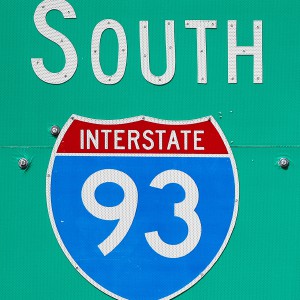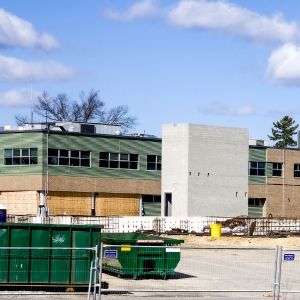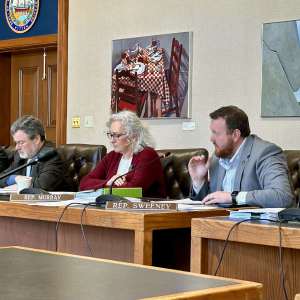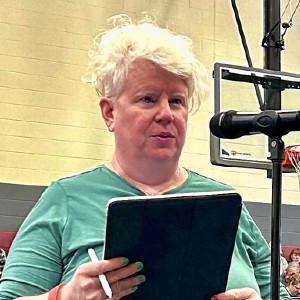Dartmouth faculty censure of Beilock further highlights divide over response to protest
| Published: 05-22-2024 10:58 AM |
For weeks, the Dartmouth community has debated President Sian Leah Beilock’s decision to call in police on May 1 to arrest 89 protesters who were in violation of the college’s “time, place and manner” policy that guides demonstrations.
On Monday afternoon, roughly half of the 600 members of the college’s faculty of arts and sciences gathered at the Hanover Inn, where a small majority decided that they were equipped with the time, place and manner to formally admonish her.
By paper ballot, 183-163, they voted to censure Beilock.
The reprimand is the first of its kind in Dartmouth’s 254 years.
“We do not want to give tacit permission for the militarization of our campus,” said Ainsley Morse, an associate professor of comparative literature, before the vote. “This is not a lesson about civic engagement we want any Dartmouth students to learn.”
Beilock has faced white-hot scrutiny since her administration made the decision to invite police to break up a pro-Palestinian demonstration on the Green. Within hours of peaceful protesters pitching a handful of tents, officers in riot gear from a state “special operations unit” marched on the encampment and arrested scores of people, including more than 60 students and five Dartmouth employees.
While a censure is a significant rebuke, it is symbolic and does not come with a call for resignation. Professors Christopher MacEvitt and Annelise Orleck — both arrested on May 1 — moved and seconded, respectively, discussion on the motion.
A “no-confidence” vote by the faculty would have been a harsher reprimand, as such votes are usually accompanied by a request for a leader to resign. Last week, Dartmouth undergraduate students presided over their own no-confidence resolution on Beilock. Like the censure, it also passed by a slim margin — 52% to 48%.
Article continues after...
Yesterday's Most Read Articles
 House committee defunds relief program for mothers and children, spares SNAP incentives
House committee defunds relief program for mothers and children, spares SNAP incentives
 No high-speed E-ZPass at Hooksett tolls for at least two months
No high-speed E-ZPass at Hooksett tolls for at least two months
 New Hampshire law enforcement to step up traffic enforcement on Route 106
New Hampshire law enforcement to step up traffic enforcement on Route 106
 Schools in Lakes Region explore creating a special education school to bring down costs
Schools in Lakes Region explore creating a special education school to bring down costs
 Work continues on new state psychiatric hospital in Concord
Work continues on new state psychiatric hospital in Concord
 House committee reverses vote, adopts prohibition on DEI activities and spending
House committee reverses vote, adopts prohibition on DEI activities and spending
Turnout was similar in both instances, with 60% of eligible students participating in the online vote and about 58% of eligible faculty members voting on Monday.
The censure vote was initiated by a petition signed by 107 faculty members, which also requested that Monday’s meeting not occur in executive session, as a faculty-wide meeting held last week was, “given the impact of President Beilock’s conduct on the entire teaching faculty.”
“For the second time this academic year, President Sian Leah Beilock invited the Hanover Police Department to break up a peaceful student protest on Dartmouth College’s campus,” the motion read, resulting in “the arrest of 89 people and their partial ban from the Dartmouth campus,” as well as “harm to students, faculty, staff, and community members.”
The college first brought in police in late October, after two students pitched a tent on the lawn outside Beilock’s office to protest against Dartmouth’s investments in companies with ties to Israel. The pair were arrested and are awaiting the resumption of their trial.
The Dartmouth Board of Trustees, however, continues to “unequivocally and unanimously” support Beilock, wrote chair Liz Lempres in an email. “As so many have noted on and off Dartmouth’s campus, amid nearly impossible circumstances, her strong leadership is to be commended.”
After Monday’s result, college spokesperson Jana Barnello emailed a statement to the Valley News. “This year has been a tumultuous and difficult one across higher education, and Dartmouth is no exception,” Barnello wrote.
“The results of these votes reflect the deeply divided feelings across the nation and around the world about the Israel-Hamas war, and, here at home, concerns about some of the language and other issues related to the protests, the involvement of police in addressing protest encampments, and the best ways to keep our community safe. We are focused on supporting one another, on continuing to make space for dialogue across difference, and on moving forward together.”
The arrests, however, disrupted Dartmouth’s educational mission and had the effect of “curtailing dialogue,” the censure motion read.
“Dialogue” proved to be a flashpoint word Monday.
Moving forward, Beilock said in remarks to the assembled faculty before voting began, “will require a lot of work and dialogue.”
She doubled down on her decision, emphasizing that it was made in a moment of stress, particularly considering the context of other encampments across the country, which have turned violent as counter-protesters and police clash with their occupants.
“I stand here today knowing that the community is divided as a result of a decision I made,” Beilock said. “I’m owning it and the consequences that flow from it.”
As the referendum on her leadership unfolded, Beilock mostly kept her eyes trained on the table that she was seated at in the front of the ballroom.
Rather than the vitriol that she said has characterized campus relations since the arrests, Dean of the Faculty Elizabeth Smith said to the crowd that she’d like to see dialogue “take root” and then “propagate.”
“This year I have a sense of escalating tension and strain within our community that isn’t like any I have experienced before,” Smith said.
Then she waxed poetic, literally, on the state of the Dartmouth community, quoting bards Mary Oliver and Pablo Neruda, as well as actor Alan Alda.
“Someone I loved once gave me a box full of darkness,” said Smith, a biological sciences professor, quoting from Oliver’s poem “The Uses of Sorrow.” “It took me years to understand that this, too, was a gift.”
“Here’s the thing,” she said. “It’s OK to be angry. But for some, this anger seems to have led to contempt.” Contempt, she said, “is dangerous,” because it makes “compromises and progress impossible.”
For others though, a censure was in fact a compromise, as well as a required step if the college is to move on from the deep divisions the events of the past academic year have wrought.
“I understand the administration’s position” that once it turned security of the event over to the Hanover Police Department, the proceedings were “out of its hands,” said Jeff Sharlet, a professor of creative writing. But now, he said, “the question of the scale of that response is in our hands.”
Considering a “militarized response never before seen in Dartmouth’s history,” Sharlet supported the motion to censure, he said.
In a statement following the vote, Dartmouth’s chapter of Faculty and Staff for Justice in Palestine wrote that the censure calls “on college leadership to change course and to return to a deliberative process with broad faculty involvement.”
The group urged the administration to “begin the process of repair” by dropping all charges and bans against students, faculty, staff and community members arrested in May and October, as well as reaffirming its commitment to protecting peaceful protest, make a concrete plan for divestment “from Israeli occupation and apartheid,” and publicly reject “the conflation of anti-zionism and anti-semitism.”
Discussion on Monday proceeded from three camps: one microphone on the left side of the room was designated for those who did not support the censure motion, the other on the right was for those who supported the motion, and in the middle was the microphone for those who wanted to comment without taking a side.
Under Smith’s moderation, speakers took turns at each microphone stand.
Irene Kacandes, a professor of German studies and comparative literature, shot back at what she referred to as the “bizarre logic” of the Beilock administration’s “insistence on a comparison to other campuses,” when justifying the police presence at the peaceful protest that unfolded in the Upper Valley.
“We are not other campuses,” she said. She asked whether Beilock had any advisors on May 1 who “knew what this campus was about.”
She mentioned the accolades the college had received for fostering healthy dialogue in the weeks after the Hamas invasion of Israel on Oct. 7.
“Our colleagues in Jewish and (Middle Eastern) studies got together immediately to try to keep this a community of scholarship,” she said. “Our colleagues … did that together as Jews, Arabs, Muslims, as non-believers, and I was so proud of every single one of them.”
“That is our history,” Kacandes said, “and where the hell was that on May 1?”
Spanish professor José del Pino, speaking against the censure on Monday, began by commending the crowd “for being so civil,” he said, noting that no one interrupted or shouted down speakers.
“This is not something that happens in all U.S. universities or abroad, so there is room for help.”
However, in the “rhetoric” against Beilock, “there is some hostility, and a sense of self-righteousness which I find excessive. Unlike college professors, administrators cannot afford themselves to become activists,” he said.
“She does not deserve censure,” he said, “but praise.”
Others who spoke against the motion warned that it would bring more bad publicity to campus.
“Censuring the president will not bring anything good to Dartmouth,” said Margaret Graver, a professor of classics. “It will not bring us any sort of closure, it will not make any progress on the very real issues that trouble us. What it will do is it will draw national media attention not only to her but to us, attention from journalists and columnists who do not care about Dartmouth, who will not bother to find out what the real complexity of our situation is.”
But for many supporters of the censure, the issue that prompted it is far from complex.
Referencing the October arrests of the two demonstrators at Parkhurst, Jodi Kim, a professor of English, noted that Dartmouth now has “the unique distinction” of being the first to arrest protesters.
In May, she said, the college proved itself “unique” again in the swiftness of its police response as well as in the proportion of students arrested.
In her first year at the college, Kim said, she learned that “the administration here is highly concerned with controlling the narrative and optics, perhaps more so than actual” redress.
“The other thing I’ve learned about Dartmouth,” she added, is how its community is partial to alliteration.
In that spirit, Kim said she wished she’d gotten to know a “different Dartmouth.”









 Henniker ponders what is a ‘need’ and what is a ‘want’
Henniker ponders what is a ‘need’ and what is a ‘want’ Boscawen residents vote to fund major renovation of public works building
Boscawen residents vote to fund major renovation of public works building ‘Voting our wallets’: Loudon residents vote overwhelmingly against $1.7M bond for new fire truck
‘Voting our wallets’: Loudon residents vote overwhelmingly against $1.7M bond for new fire truck In Pembroke, Education Freedom Accounts draw debate, voters pass budget
In Pembroke, Education Freedom Accounts draw debate, voters pass budget
